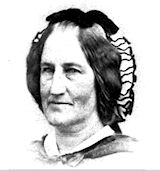Headquarters Porter’s Div., 3d Army Corps,
Camp No. 5, April 16, 1862.
 Dear Hannah, — The bombardment proper of Yorktown will not begin probably till 5 or 6 days from now, although there are scrimmages taking place every day, either between our gunboats and the rebel batteries or between our artillery and their batteries. To-day we have had both kinds, our artillery in Hamilton’s division having fired continually from early this morning, and being as warmly replied to by the rebels. From a dead or leafless tree behind the general’s tent, a ladder some 75 feet in length has been built, and this we use as a look-out. From this ladder I saw our gunboats and the rebels’ batteries fire at each other, but without any injury to either side. Our fuses were all too short, the shell bursting in the air a mile off from the rebel battery. They fired from a large 105-pound pivot gun, and fired very well, too. The shot, many of them, struck within a few feet of the gunboat.
Dear Hannah, — The bombardment proper of Yorktown will not begin probably till 5 or 6 days from now, although there are scrimmages taking place every day, either between our gunboats and the rebel batteries or between our artillery and their batteries. To-day we have had both kinds, our artillery in Hamilton’s division having fired continually from early this morning, and being as warmly replied to by the rebels. From a dead or leafless tree behind the general’s tent, a ladder some 75 feet in length has been built, and this we use as a look-out. From this ladder I saw our gunboats and the rebels’ batteries fire at each other, but without any injury to either side. Our fuses were all too short, the shell bursting in the air a mile off from the rebel battery. They fired from a large 105-pound pivot gun, and fired very well, too. The shot, many of them, struck within a few feet of the gunboat.
We came quite a dodge on the rebels a few nights ago. General Porter, who by the way is terribly anxious to get at the rebels, ordered out all our batteries at 2 o’clock A.M., and ordered them to open fire on the encampments of the enemy, which they did with a good will. Just imagine being waked up at that time of night by shot and shell falling into your tent. I only hope they will not open on us from their big pivot gun, for we are just in range of it. Our encampment is quite pretty. We have planted pine trees all around it, and so manage to protect ourselves very well from the heat of the sun which is getting to be quite oppressive. It is the pleasantest and prettiest place of any of the encampments I have seen.
The firing is quite lively now in Hamilton’s division. They are firing at the fort which Martin’s battery attacked on the day of our arrival, and where the 22d Massachusetts Volunteers lost ten men killed and wounded. There are frequently twenty guns fired in a minute, the reports of which we can hear quite plainly as we are only about a mile and a half from them.
I had a fine view of Yorktown and Gloucester Point yesterday. I crossed over a bridge over Creek, which bridge we have just built, and then went out to a point which projects into the river. I was about three quarters of a mile from Yorktown, and could see the rebels at work very plainly; they have two strong water batteries, and above these still stronger ones. The banks are very steep and precipitous here, and afford a fine opportunity to place works. At Gloucester Point on the opposite side, they also have strong batteries, and we could see their men all run when they saw the smoke from one of our gunboats. The shells burst near them, and made them skedaddle some.
General Porter is in very good spirits, although annoyed at the slowness of the engineers. He gets all the ox-hides, ropes, etc., which he can pick up, using them for coverings to the fascines. The general is confident of success, and I think he is right in being so. Our division is in the front and will distinguish itself, I have no doubt. The exact number of our guns is 295, 100 of which are siege guns and mortars, and the rest light artillery. . . .




